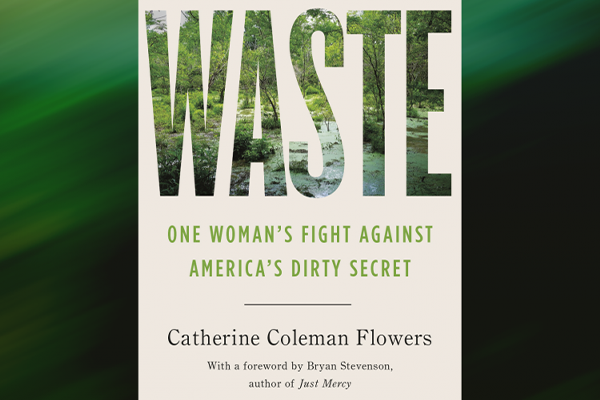
Waste: One Woman’s Fight Against America’s Dirty Secret
Inequities in waste water infrastructure is a wide-spread but largely under-appreciated problem in the United States. How can public health professionals bring light to the problem and thus help propel needed changes in policy and resource allocation?


Register
Course Information
- Audience: Public Health Professionals
- Format: Webinar
- Date/Time: Thursday, September 9th 4:30 PM – 5:45 PM EST
- Price: Free
- Length: 1.25 hours
- Credential(s) eligible for contact hours: Sponsored by New England Public Health Training Center (NEPHTC), a designated provider of continuing education contact hours (CECH) in health education by the National Commission for Health Education Credentialing, Inc. This program is designated for Certified Health Education Specialists (CHES) and/or Master Certified Health Education Specialists (MCHES) to receive up to 1 total Category I continuing education contact hours. Maximum advanced-level continuing education contact hours are 1. Provider ID: 1131137 Event ID: SS1131137_WOWFAMDSIf you are not seeking a CHES/MCHES contact hours, if you complete the post-test and evaluation, you will receive a Certificate of Completion. The Certificate will include the length of the course.
- Competencies: Community Partnership Skills
- Learning Level: Awareness
- Companion Trainings: None
- Supplemental materials:None
- Pre-requisites: None
About this Recording
SPH Reads is a school-wide reading program hosted by the Office of Diversity, Equity, Inclusion, and Justice. The 2021 book selection is Waste: One Woman’s Fight Against America’s Dirty Secret, by Catherine Coleman Flowers.
What you'll learn
At the end of the recording, participants will be able to:
- Discuss waste water infrastructure as an example of environmental injustice
- Identify examples of systemic racism and classism that have negatively affected health in the United States
- Identify possible specific activities individuals can participate in to address large issues of climate change and structural racism
Subject Matter Experts

Catherine Coleman Flowers
@CATHFLOWERSEnvironmental and Climate Justice Activist, Author

Barbara Moran
@MORANWRITERModerator
Senior Producing Editor
WBUR
Catherine Coleman Flowers is an internationally recognized environmental activist, MacArthur “genius” grant recipient, and author. She has dedicated her life’s work to advocating for environmental justice, primarily equal access to clean water and functional sanitation for communities across the United States. Founder of the Center for Rural Enterprise and Environmental Justice (CREEJ), Flowers has spent her career promoting equal access to clean water, air, sanitation, and soil to reduce health and economic disparities in marginalized, rural communities. In addition, Flowers serves as Rural Development Manager for Bryan Stevenson’s Equal Justice Initiative (EJI), is a Board Member for the Center for Earth Ethics at Union Theological Seminary, and sits on the Board of Directors for the Climate Reality Project and the Natural Resources Defense Council. Flowers is also Co-Chair of the American Academy of Arts and Sciences Commission on Accelerating Climate Action and Practitioner in Residence at Duke University. In 2021, her leadership and fervor in fighting for solutions to these issues led her to one of her most notable appointments yet — Vice Chair of the Biden Administration’s inaugural White House Environmental Justice Advisory Council. Flowers was also named Levenick Resident Scholar in Sustainable Leadership at the University of Illinois for the spring 2021 and was awarded an honorary PhD in science from Wesleyan University. As the author of Waste: One Woman’s Fight Against America’s Dirty Secret, Flowers shares her inspiring story of advocacy, from childhood to environmental justice champion. She discusses sanitation and its correlation with systemic class, racial, and geographic prejudice that affects people across the United States. She has been featured in The New York Times, The Washington Post, Bloomberg, The Guardian, and on PBS.
Barbara Moran, environmental editor, WBUR For more than 20 years, Moran has worked as a science journalist committed to covering issues of public health, environmental justice and the intersection of science and society. She has written for many publications, including The New York Times, New Scientist, Technology Review and the Boston Globe Magazine, and produced television documentaries for PBS and others. A few years ago she added radio reporting to her repertoire, and now runs WBUR’s three-person environmental team, which covers stories about energy, ecology and environmental justice for Boston and beyond. She was a Knight Fellow at MIT, and was twice awarded the National Association of Science Writers’ highest honor, the Science in Society Award.
Registration
Select the Enroll Me button below to register for this recording. If you have any trouble accessing the recording, contact support@nephtc.org.
Acknowledgement: This project is/was supported by the Health Resources and Services Administration (HRSA) of the U.S. Department of Health and Human Services (HHS) under grant number UB6HP31685 “Regional Public Health Training Center Program.” This information or content and conclusions are those of the author and should not be construed as the official position or policy of, nor should any endorsements be inferred by HRSA, HHS or the U.S. Government.

